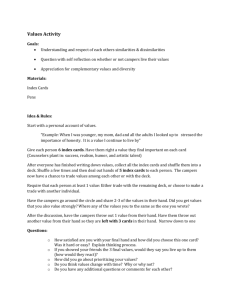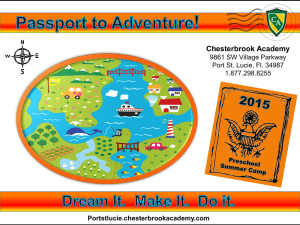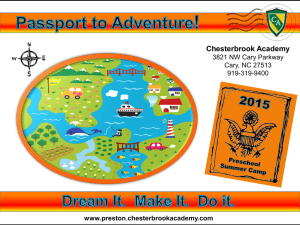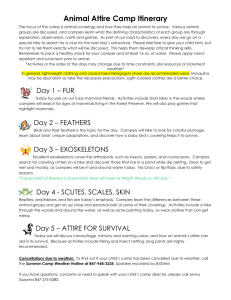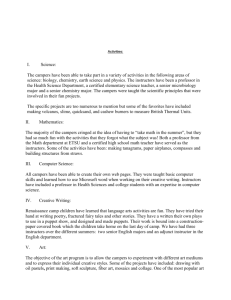The Adventurers
advertisement
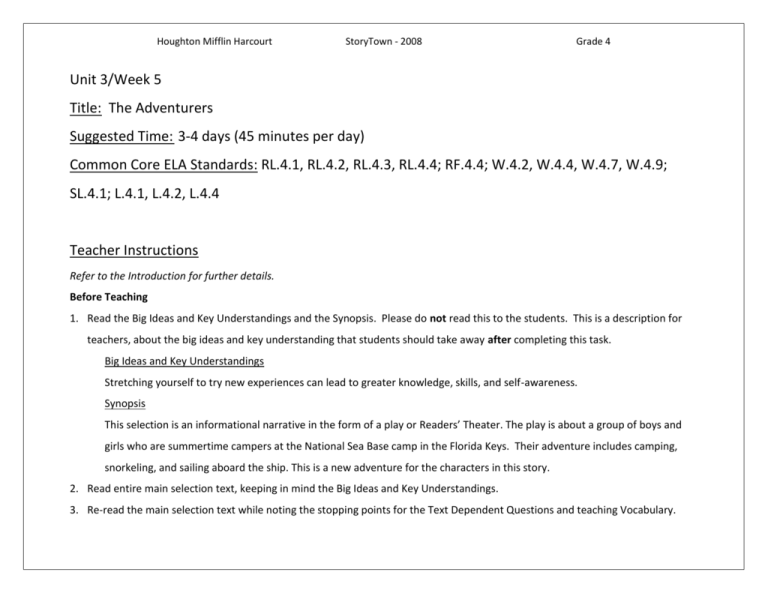
Houghton Mifflin Harcourt StoryTown - 2008 Grade 4 Unit 3/Week 5 Title: The Adventurers Suggested Time: 3-4 days (45 minutes per day) Common Core ELA Standards: RL.4.1, RL.4.2, RL.4.3, RL.4.4; RF.4.4; W.4.2, W.4.4, W.4.7, W.4.9; SL.4.1; L.4.1, L.4.2, L.4.4 Teacher Instructions Refer to the Introduction for further details. Before Teaching 1. Read the Big Ideas and Key Understandings and the Synopsis. Please do not read this to the students. This is a description for teachers, about the big ideas and key understanding that students should take away after completing this task. Big Ideas and Key Understandings Stretching yourself to try new experiences can lead to greater knowledge, skills, and self-awareness. Synopsis This selection is an informational narrative in the form of a play or Readers’ Theater. The play is about a group of boys and girls who are summertime campers at the National Sea Base camp in the Florida Keys. Their adventure includes camping, snorkeling, and sailing aboard the ship. This is a new adventure for the characters in this story. 2. Read entire main selection text, keeping in mind the Big Ideas and Key Understandings. 3. Re-read the main selection text while noting the stopping points for the Text Dependent Questions and teaching Vocabulary. Houghton Mifflin Harcourt StoryTown - 2008 Grade 4 During Teaching 1. Students read the entire main selection text independently. 2. Teacher reads the main selection text aloud with students following along. (Depending on how complex the text is and the amount of support needed by students, the teacher may choose to reverse the order of steps 1 and 2.) 3. Students and teacher re-read the text while stopping to respond to and discuss the questions and returning to the text. A variety of methods can be used to structure the reading and discussion (i.e.: whole class discussion, think-pair-share, independent written response, group work, etc.) Text Dependent Questions Text-dependent Questions Reread page 393 and look at the illustration on pages 392 and 393. Why is “The Adventurers” a good title for this play? How are the boys and girls feeling when they are preparing to board the Intrepid on pages 393 and 394? What does Captain Jane say to the campers about what they can expect during the trip? Evidence-based Answers The name of the camp is the “National High Adventure Sea Base camp. The campers are a group of boys and girls going on an adventure that includes taking a sailing trip on the ship the Intrepid. The illustration is of the campers and Captain sailing on the ship. The characters have expressions that look excited and nervous. The boys and girls are worried and nervous. Alicia is concerned that it is hot; Raul is complaining that his backpack is heavy, and Zack wants to know about the location of the seasickness medicine. Rachel is concerned that she has “never done anything like this before”. Captain Jane assures the campers that by the end of the trip, they will be “seasoned sailors”. She tells the campers that she will teach them every function of the ship from the bow to the stern, and that she is there for guidance. She prepares them that undoubtedly they will have some uncomfortable conditions, but if they pay attention and Houghton Mifflin Harcourt StoryTown - 2008 Reread the dialogue on page 395. What are a “landlubber” and a “salty sea dog”? Why did Captain Jane compare the campers to “landlubbers” and “salty sea dogs”? What important skills did the campers learn about survival while camping at Big Munson Key? (Pg. 396) “Pristine” means clean and untouched. On page 398, the author wrote, “These reefs must remain in pristine condition to survive.” What does “pristine” have to do with how the campers treated the coral? How did the campers describe the coral? What can be inferred about how coral grows? Predators are animals that kill and eat other animals. The text says, “You won’t find those kinds of predators in a coral reef. It’s not their natural habitat.” To what kinds of predators are they referring? (Pg. 398) The name of the ship in the story is Intrepid. Intrepid means to be brave and fearless. How did the characters in the story show that they were brave? Grade 4 try their best they will cherish the experience. A salty sea dog is an experienced confident sailor, and a landlubber knows nothing about the sea. On page 395 the ship had been out to sea for one week and the students are talking about how much they have learned and how excited they are about being on the ship. Captain Jane said the students were no longer landlubbers and were now salty sea dogs. The students learned survival skills, making a fire, cooking with canned food over an open fire, and adding spices to make it taste good and surviving without technology. Rachel described the reefs as wondrous and beautiful. Zach wanted to touch the reef but he didn’t. He understood that Coral is very fragile and grows very slowly, about one foot every one hundred years. It needed to be left in pristine condition, in its original state, untouched in order to live. The author is referring to sharks. The campers started out scared but were enthusiastic about their adventure at the end of the story. The characters learn many new survival skills, including how to steer the 80-footlong ship, use the snorkeling equipment to snorkel, and camping and cooking over a fire. They were able to live without TV, e-mail, or even restaurants. . By the end of the story, the characters wanted to help with the next crew of campers and sail on more adventures with Captain Jane. Houghton Mifflin Harcourt StoryTown - 2008 Grade 4 Vocabulary STUDENTS FIGURE OUT THE MEANING sufficient context clues are provided in the text TEACHER PROVIDES DEFINITION not enough contextual clues provided in the text KEY WORDS ESSENTIAL TO UNDERSTANDING Page 393, 397, 399 - intrepid Page 398 - predators; pristine Page 393 - board (aboard); vessel; seasoned (sailors) Page 394 - anchor; anchored Page 394 - guidance; crew; “bow to stern”; venture (forth) Page 396 - survival, survive Page 396 - camp (camper); rations; drudgery Page 399 - disembark; voyage WORDS WORTH KNOWING General teaching suggestions are provided in the Introduction Page 394 - undoubtedly; hoist; conditions Page 395 - plunge Page 393 - obvious Pages 394 - cherish; experience (experiencing); expedition; function; feature Page 395 - timid Page 396 - resembles; approaches; delectable; roaring (fire); deserted Page 397 - smoldering; docked; dive; surface Page 398 - peculiar; fragile; wondrous Page 399 - privilege Houghton Mifflin Harcourt StoryTown - 2008 Grade 4 Culminating Task Re-Read, Think, Discuss, Write Create a T-chart to compare and contrast the campers from the beginning of the voyage and to the end of the voyage. Write a paragraph discussing the theme of the story and how the campers’ experiences lead them to greater knowledge, skills, and selfawareness. Answer: The theme of the story is that by stretching yourself to try new experiences can lead to greater knowledge, skills, and self-awareness. For example, at the beginning of the story the campers were worried and nervous. Alicia was concerned that it was hot; Raul was complaining that his backpack was heavy, and Zack wanted to know about the location of the seasickness medicine. Rachel was concerned that she had “never done anything like this before”. Captain Jane made a comment to the crew that they were “landlubbers” when their journey began, but that the campers were fast learners. By the end of the story, the campers wanted to stay on the ship and become a part of the crew. They felt they had learned a great deal. The campers had learned to steer the ship, build and cook over a campfire, and scuba dive while being respectful to the environment. Captain Jane said that it was a privilege to sail with such a fine crew and that she could see a ship captain in each of them. Captain Jane paid the campers a compliment when she called them “salty sea dogs.” Additional Tasks Have the students practice fluency by performing this Readers’ Theater. Steps to manage Readers’ Theater are on page T295 of the Teacher’s Edition. Houghton Mifflin Harcourt StoryTown - 2008 Grade 4 In teams of 2-3, use Internet look up interesting information about the National High Adventure Sea Based Camp discussed in the story. Create a travel brochure to persuade people to visit the camp. Share your brochure with another team. Is “The Adventurers” considered a poem, drama, or prose? Describe the structural elements from the story to support your answer. Answer: This story is a drama based upon the information at the beginning of the story, cast of characters are identified, the setting is described by a narrator, and dialogue is used to tell the story in a script form. Note to Teacher This story contains a multitude of multiple-meaning words. Houghton Mifflin Harcourt StoryTown - 2008 Grade 4 Name _______________________________________________ Date ________________ “The Adventurers” 1. Reread page 393 and look at the illustration on pages 392 and 393. Why is “The Adventurers” a good title for this play? 2. How are the boys and girls feeling when they are preparing to board the Intrepid on pages 393 and 394? What does Captain Jane say to the campers about what they can expect during the trip? 3. Reread the dialogue on page 395. What are a “landlubber” and a “salty sea dog”? Why did Captain Jane compare the campers to “landlubbers” and “salty sea dogs”? 4. What important skills did the campers learn about survival while camping at Big Munson Key? (Pg. 396) Houghton Mifflin Harcourt StoryTown - 2008 Grade 4 5. “Pristine” means clean and untouched. On page 398, the author wrote, “These reefs must remain in pristine condition to survive.” What does “pristine” have to do with how the campers treated the coral? How did the campers describe the coral? What can be inferred about how coral grows? 6. Predators are animals that kill and eat other animals. The text says, “You won’t find those kinds of predators in a coral reef. It’s not their natural habitat.” To what kinds of predators are they referring? (Pg. 398) 7. The name of the ship in the story is Intrepid. Intrepid means to be brave and fearless. How did the characters in the story show that they were brave?
